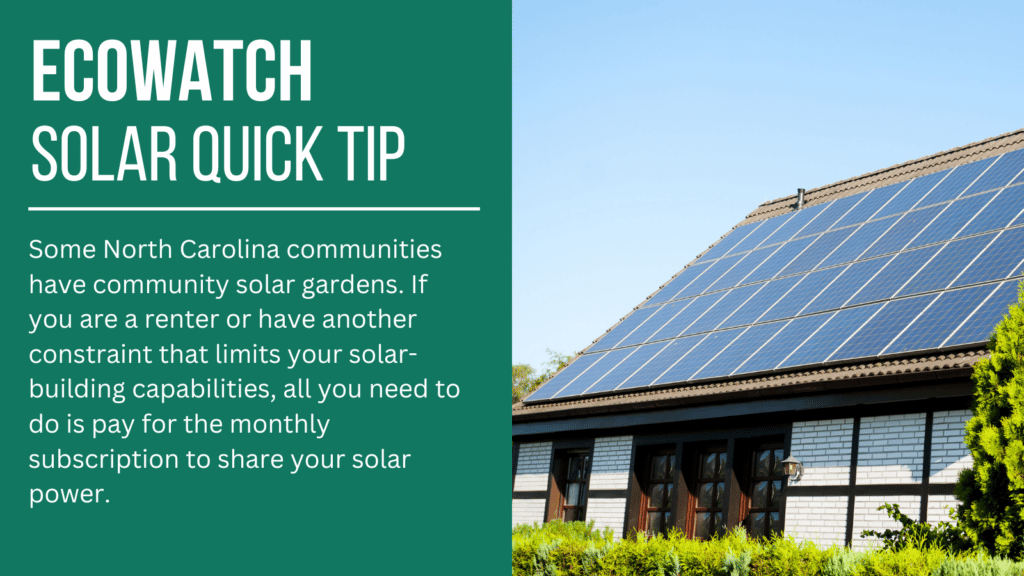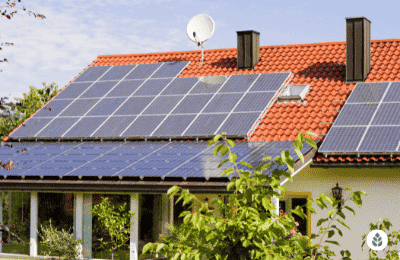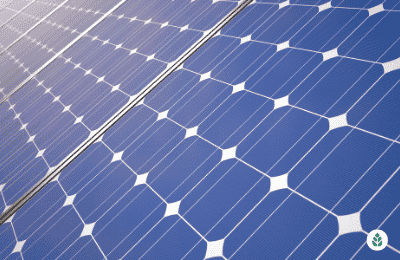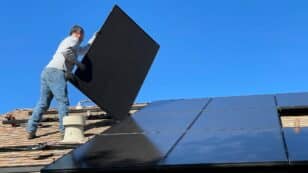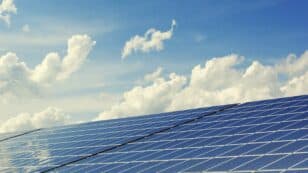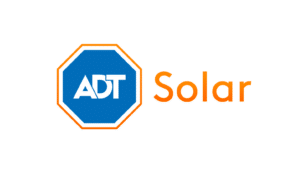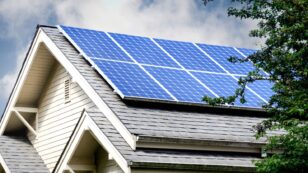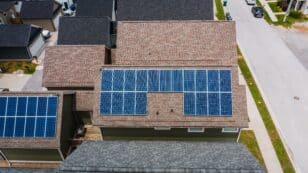
Top 7 Best Solar Companies in North Carolina (2024 Reviews)
Here’s what you’ll learn in this guide to the best solar installers in North Carolina:
- What are the best solar companies in North Carolina?
- How do I choose a solar installer in North Carolina?
- How do I save money on solar panels in North Carolina?
Each product and or company featured here has been independently selected by the writer. You can learn more about our review methodology here. If you make a purchase using the links included, we may earn commission.
North Carolina is one of the best places in the country to convert to solar energy. The cost of solar equipment is below average, energy consumption is quite high and the local solar incentives are excellent. While going solar is an easy decision that saves the average North Carolina resident $24,794 or more on energy bills after their panels are paid for, choosing the best solar installer is challenging, especially since there are nearly 100 to choose from in the state.
In this guide, we’ll be discussing what we believe are the best solar companies in North Carolina. We’ll explain why we trust each of them, what they can deliver in terms of equipment and customer service and what we believe you should prioritize looking for in a solar installation company in North Carolina.
What Are the Best Solar Companies in North Carolina?
We’ve spent hours upon hours reviewing dozens of solar providers, and we believe the following are the best solar companies in North Carolina overall:
- SunPower: Best National Provider
- Blue Raven Solar: Best Financing Options
- ADT Solar: Best Warranty Coverage
- Solar SM: Best Regional Provider
- Renu Energy Solutions: Best Customer Service
- 8M Solar: Best Local Installer
- NC Solar Now: Most Local Experience
Compare North Carolina’s Top-Rated Solar Providers
Overall, we recommend SunPower or Blue Raven Solar to most North Carolina residents, as we feel these providers offer the best quality for the money. We’ll include some key information about these installers and the others on our list in the table below so that you can compare them side-by-side.
| Solar Providers | Superlative | Our Score | Avg Cost ($–$$$$$) | Warranty | Financing Options | Get Quote |
| SunPower | Best National Provider | 5/5 | $$$$ | Varies – minimum of 25 years for equipment, workmanship and production | Cash, solar loan, solar lease, PPA | Get Quote |
| Blue Raven Solar | Best Financing Options | 4.5/5 | $$ | 25 years for equipment and performance; 10 years for workmanship | Cash and solar loans | Get Quote |
| ADT Solar | Best Warranty Coverage | 4/5 | $$$ | 25 years for equipment, workmanship and production | Cash or solar loan | |
| Solar SME | Best Regional Provider | 4.5/5 | $$$ | 25 years for equipment, production and workmanship | Cash, solar loan, solar lease, PPA | Get Quote |
| Renu Energy Solutions | Best Customer Service | 4/5 | $$$ | 25 years for equipment and production | Cash, solar loan | Get Quote |
| 8M Solar | Best Local Installer | 5/5 | $$ | 25 years for equipment and production; 20 years for workmanship | Cash, solar loan | Get Quote |
| NC Solar Now | Most Local Experience | 4.5/5 | $$ | 25 years for equipment and production; 12 years for workmanship | Cash, solar loan | Get Quote |

SunPower
Pros
- Most efficient panels on the market
- National coverage
- Cradle to Cradle sustainability certification
- Great warranty coverage
Cons
- Expensive
- Customer service varies by local dealer

Blue Raven Solar
Pros
- Industry-leading in-house financing
- Competitive pricing
- Excellent reputation
Cons
- Doesn't offer solar batteries (coming 2022)
Blue Raven Solar keeps upfront payments and interest rates low and includes 18 months of interest-free financing to help provide immediate solar savings.
Blue Raven currently only installs solar panels, but with batteries being a less popular option in North Carolina than in many other states, this is only a minor downside.
Why We Chose Blue Raven Solar as the Best for Financing Options
The BluePower Plus+ financing program makes solar more accessible than ever before by minimizing interest payments over time and eliminating initial costs. You don’t need any cash to finance with this program.
The best part of BluePower Plus+ is the 18 months of interest-free financing, which lets you accrue some energy savings and pay off a significant chunk of your system costs before ever actually paying anything out of pocket. This is especially helpful in an area like North Carolina, where electric bills are above average. As such, those savings in the first year and a half will be higher than what most Americans would likely see.
Access to high-value financing programs like this are going to be even more valuable in the future when NEM 3.0 is adopted and solar storage becomes the norm. Soon, most residents will need to invest in batteries as well to offset their consumption. The need for batteries will be even higher in North Carolina — with additional costs of between $10,000 and $20,000 — due to the high rate of electricity consumption.
Blue Raven is a large national company, but it still manages to provide great customer service. If you’re looking for the availability and below-average pricing of a national company but still want to feel like a valued customer, we believe Blue Raven is an outstanding option.
What We Don’t Like
In our opinion, there are two relatively minor downsides to working with Blue Raven Solar.
The first is that the company only installs solar panels. It stated that it would start installing batteries as well, but that has yet to happen. This is going to be a bigger issue in the coming years when the new net metering policy takes effect, as batteries will be all but necessary to enjoy solar savings. It’s possible to go with Blue Raven and then retrofit your system with batteries, but then you can’t take the ITC for the storage system as well. Ultimately, that could mean you miss out on an average of $4,500 of tax credits if you go solar without batteries and add them later.
Additionally, Blue Raven doesn’t accept leases or PPAs. The company’s solar loan options are outstanding and widely accessible, but for those that won’t qualify for loans, we’d love to see leases and PPAs available as well. Again, fewer people will qualify for solar loans in the near future when the need for batteries pushes up the cost of solar conversion.
Read our full review of Blue Raven Solar for more information.
Solar Products
Blue Raven installs panels manufactured by Canadian Solar, Trina, Hyundai and SolarEdge. All of these are tier-one solar brands, and while they don’t match the efficiency of Maxeon panels, they should provide plenty of efficiency to offset your energy bills, especially given the above-average amount of sunlight in the area.
If you’re looking to minimize your all-in solar costs, we’d recommend choosing SolarEdge panels. These have the lowest per-watt cost of the four. If you’d prefer to maximize panel efficiency and have the best chance of eliminating your energy bills, we’d suggest Trina panels, which have the highest efficiency of the four.
Blue Raven doesn’t offer any batteries or EV chargers, but it does install Enphase inverters and the Enphase solar monitoring app. It has also mentioned that it will start offering batteries in the future.
Financing Options
Blue Raven only accepts cash purchases and solar loans through its in-house financing program, BluePower Plus+. While we’d ideally like to see all four options for accessibility, the solar loan program is one of the best and most accessible in the industry, so this is still a company that will appeal to most North Carolinians.
We’d still recommend a cash purchase if you can make it work, as this will lead to greater savings overall.
Warranty Information
Blue Raven Solar includes a 25-year warranty for all of its equipment and the panel efficiency. The efficiency warranty is great to have, as it helps ensure your panels continue to offset your above-average energy bills over time.
The workmanship warranty is just ten years. While this is in line with the industry average, we would love to see lengthier coverage, especially in an area like North Carolina that sees above-average rainfall each year and frequent severe weather, including hurricanes and tropical storms.
Facts and Figures: Blue Raven Solar
| EcoWatch Rating |
|---|
| Better Business Bureau (BBB) Rating |
| Year Founded |
| Average Cost ($-$$$$$) |
| Solar Services |
| Brands of Solar Equipment Offered |
| Warranty Coverage |
| 4.5 |
| A+ |
| 2014 |
| $$ |
| Solar Panels, System Monitoring |
| Trina Solar, Canadian Solar, SolarEdge, Silfab, SunPower |
| 25-year manufacturer warranty; 10-year workmanship warranty, 2-year production guarantee |

Solar SME

Regional Service
Average cost
Pros
- Great warranty coverage
- Comprehensive service offerings
- Offers products from leading manufacturers
Cons
- Some reported communication issues
The customer service provided by this installer is usually outstanding and earns the company near-perfect customer reviews online. It also provides great warranty coverage.
Solar SME has some issues with spotty customer service, but overall, it’s our number-one recommended regional solar installer in North Carolina.
Why We Chose Solar SME as the Best Regional Provider
Solar SME strikes a unique balance between the affordability and accessibility you’d expect from a national company with the customer service and attention you’d more often see from a small local company. Most of the company’s online reviews are overwhelmingly positive, with customers raving about fast response times and professionalism.
The company employs installation technicians that are NABCEP-certified (North American Board of Certified Energy Practitioners), which offers reassurance that your panels are being installed properly. Along with its decade of experience, this helps ensure that you don’t run into issues with the state’s extreme weather causing damage to your system or your home.
Solar SME also provides peace of mind by including robust warranty coverage on all of its systems. Your panels, panel production and the labor are all covered for 25 years, which is outstanding.
Finally, Solar SME accepts all four primary payment options for its services. Its average pricing means you can expect to pay around $33,705 for your system before the federal credit or closer to $23,594 after the credit. If you include a battery with your system, your average costs will be $43,705 and $33, 594 before and after the ITC, respectively.
What We Don’t Like
The only real downside we see to working with Solar SME is that the great customer service that most customers experience can be spotty. Based on customer reviews, it seems as though your experience can vary based on which local branch serves your area.
Other than the potential for less-than-ideal customer service, we believe Solar SME is an incredible option overall for North Carolina homeowners.
Solar Products
Solar SME carries a large number of residential solar panel brands, including REC, Trina, Panasonic, Silfab, Solaria, QCells and SolarEdge. That means there’s very likely to be something that suits your needs, whether you’re looking to prioritize low installation costs or panel efficiency.
If you want to keep your costs as low as possible, we’d suggest considering panels from Solaria or SolarEdge. The panels from Panasonic have the highest efficiency of the bunch, so these should help keep production as high as possible.
Below is the extensive list of additional products and services you can choose from Solar SME:
- Ground-mount solar systems
- LG Chem RESU batteries
- Generac PWRCell
- Panasonic EverVolt batteries
- Enphase Encharge batteries
- Solax Solar Battery storage systems
- A variety of EV chargers
- The Enphase solar monitoring app
The wide range of batteries provided by Solar SME is outstanding, and this definitely sets the company apart from the competition. This will be a huge asset once batteries become the norm in the wake of the upcoming change to net metering.
Financing Options
Solar SME accepts all four primary solar payment options, including cash, solar loans, leases and PPAs.
As is the case with all other installers, we strongly suggest a cash purchase through this provider if you can make it work. This will be the most beneficial option for you over time, although it will come with the highest cost — an average of $33,705 upfront. Loans are more accessible with an average upfront cost of $0, but a little less beneficial, given that you’ll pay interest on top of your system costs. Over time, a loan will lead to additional payments of around $6,200 over the life of the loan.
Leases and PPAs are the most accessible but the least beneficial in the long run.
Warranty Information
Solar SME’s warranty coverage is ideal for North Carolina residents, as it covers the equipment, the panel production and the installation labor for 25 years each.
The labor warranty is 2.5x what most companies offer, which is great in an area with frequent severe weather. The production warranty is also a little longer than the industry average and can help offset your above-average energy consumption in the area.
Facts and Figures: Solar SME
| EcoWatch Rating |
|---|
| Better Business Bureau (BBB) Rating |
| Average Cost ($-$$$$$) |
| Solar Services |
| 4.5 |
| A |
| $$$ |
| Solar Panels, Solar Batteries, Electrical Work, Community Solar |

Renu Energy Solutions

Regional Service
Average cost
Pros
- Excellent reputation
- Many financing options
- Representatives are experts on local policies
- No leases or PPAs
Cons
- Doesn’t have a formal workmanship warranty
- Less equipment brand options available
Renu Energy Solutions offers incredible customer service and customer care, and it makes most customers feel like they’re getting personalized, one-on-one service.
The biggest downside to this installer is the lack of a formal workmanship warranty, but it’s still a solid option in North Carolina.
Why We Chose Renu Energy Solutions as the Best for Customer Service
Renu Energy Solutions serves North Carolina and South Carolina, with offices in Charlotte, Raleigh, Asheville, Columbia and Greenville. Although this technically isn’t a local company, it’s small enough that it can still provide the kind of customer care you’d expect from a single-branch solar installer.
Most of the customer reviews for Renu are positive, with customers noting how hands-on and communicative the company was throughout the entire conversion process.
As an installer that services the Carolinas only, Renu also has localized experience and is familiar with local solar incentives. That means your system is customized to suit your local needs, and its reps can likely help you save money on your system by taking advantage of incentives and rebates. Most larger companies simply can’t offer this kind of one-on-one service.
Renu has lengthy equipment and power production warranties, too, the latter of which can help ensure you continue to offset your electric bills for decades after the installation is completed.
What We Don’t Like
The biggest downside to Renu is that the company lacks a formal workmanship warranty. Labor warranties are useful for providing peace of mind through North Carolina’s extreme weather. With that being said, though, the company’s installers are NABCEP-certified, which should install some confidence in most customers.
Additionally, Renu doesn’t accept leases or PPAs. Although the pricing is about average, the lack of low-cost financing options means that this installer will appeal to fewer customers than some other companies. This is a bigger deal in North Carolina than in most other states, as the all in cost of converting to solar in NC is around $3,735 higher than you’d pay in most other states.
Another pretty minor drawback is the minimal number of equipment brands available, which does hinder customizability a bit. Other companies, like Solar SME, provide a wide range of products to let homeowners pick and choose what works best for them.
Read our full review of Renu Energy Solutions for more information.
Solar Products
Renu Energy Solutions installs panels manufactured by REC and Tesla, so the options are limited.
If you’re looking to maximize your system’s efficiency rating, we’d recommend the REC panels. Tesla panels have a lower cost per watt, so they’re better for keeping installation costs down.
Below is a list of some other products and services Renu provides to customers:
- Tesla solar roof shingles
- Tesla Powerwalls
- Enphase Encharge solar batteries
- LG ESS Home 8, which is a power monitoring and storage solution to maximize energy savings; this is more popular in areas that don’t have net metering policies
- Hurricane preparation installations
- Tesla Wall Connector EV chargers
- Tesla and Enphase solar monitoring mobile apps
Financing Options
Unfortunately, Renu Energy Solutions isn’t as accessible as it could be, as it only accepts cash purchases and solar loans. We’d really love to see leases and PPAs offered as well. Even though these are less beneficial, they can be great options for homeowners who can’t make a cash purchase or loan work.
Of the two options available, we’d recommend a cash purchase, as this will cost you more upfront but will end up saving thousands more dollars in most cases.
Warranty Information
Renu includes a 25-year equipment and performance warranty. The equipment warranty is average, and the performance warranty is five years longer than the industry average.
Unfortunately, the company doesn’t have a workmanship warranty, so it’s not as beneficial as the average 10-year warranty you’d get from most installers. This is a pretty significant drawback, especially since rooftop solar arrays in North Carolina are at an increased risk of damage due to the hurricanes and tropical storms that frequent the area.
Facts and Figures: Renu Energy Solutions
| EcoWatch Rating |
|---|
| Better Business Bureau (BBB) Rating |
| Average Cost ($-$$$$$) |
| Solar Services |
| 4.5 |
| A+ |
| $$$ |
| Solar Panels, Solar Batteries, EV Chargers, Roofing Services, Energy-Efficiency Audits |

8M Solar
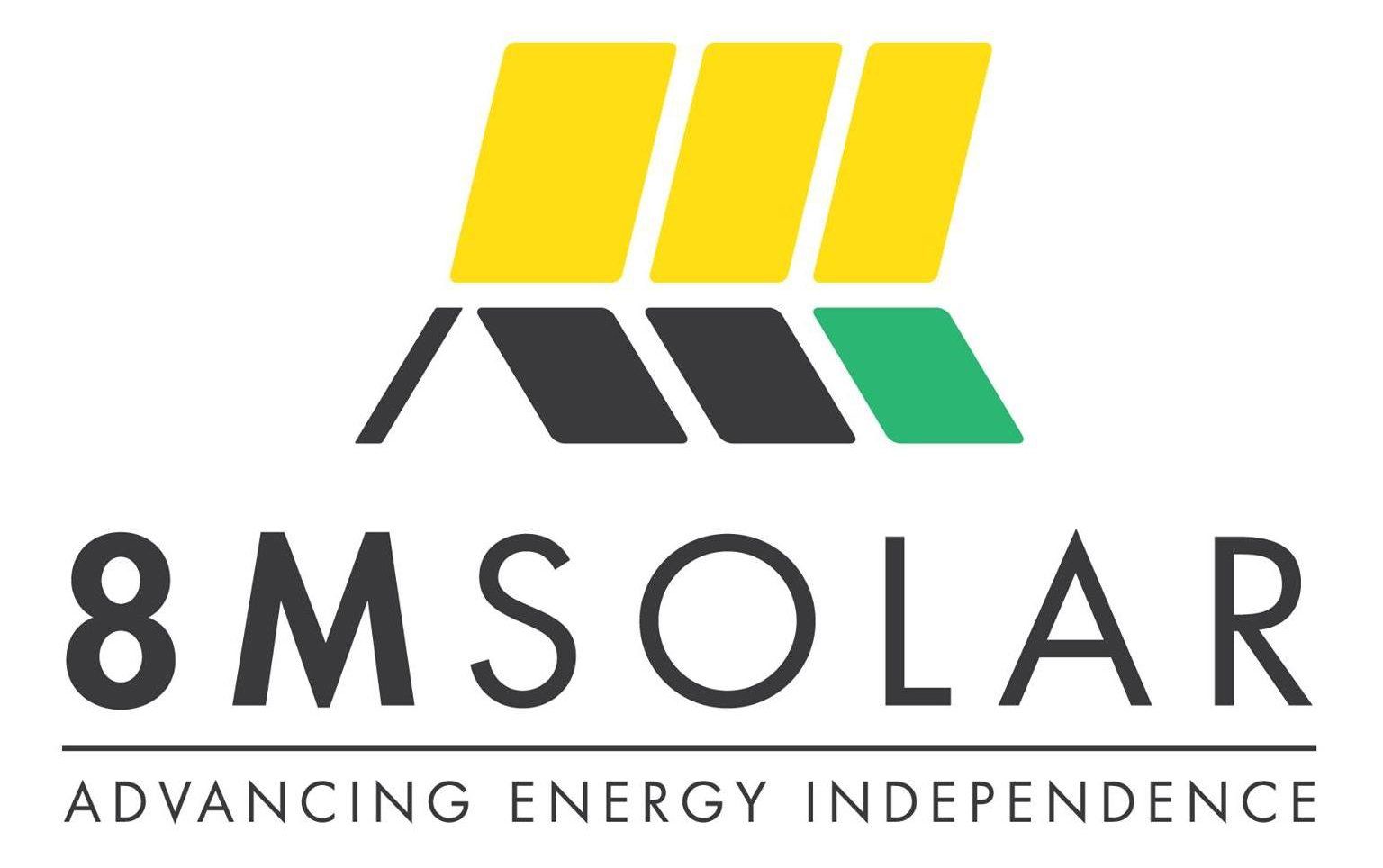
Local Service
Average cost
Pros
- Competitive pricing
- Representatives are experts on local policies
- Offers products from leading manufacturers
- Great warranty coverage
Cons
- Some reported issues with financing partners
If you’re looking for a small local company that can provide stellar customer service, constant communication and customer care, we recommend 8M Solar.
8M Solar is a bit less accessible than other providers, but we think this company will meet and exceed most customers’ expectations.
Why We Chose 8M Solar as the Best Local Installer
8M Solar is a small solar company that only operates in North Carolina. It is headquartered in Raleigh but serves most of the state through other local branches. It has completed over 1,000 solar installations in NC since 2009, so it has extensive experience customizing systems for the local energy needs and weather.
8M Solar’s representatives are more in tune with the local needs of NC solar customers than most companies will be, and its reps are intimately familiar with local solar incentives. That means they can very likely help save you money by taking advantage of perks offered by individual municipalities and energy companies like Duke Energy.
The company also takes an educational approach to solar energy. By offering honest information about the benefits of solar in North Carolina and alerting customers to changing solar policies, it helps make solar more easily understandable and helps homeowners find the most energy savings over time. Many other companies prioritize profits and installation numbers, so it’s refreshing to see a provider that makes education and long-term solar adoption a priority instead.
What We Don’t Like
There’s not much we can say about 8M Solar that isn’t positive.
The only real downside, in our opinion, is that the company doesn’t accept leases or power purchase agreements. We do believe paying with cash or a loan is significantly more beneficial for you over time, but we like to see companies offering a wealth of solar financing options to appeal to a bigger audience.
In the near future, the adoption of NEM 3.0 will increase solar adoption costs by an average of $15,000 for most homeowners, as it will all but necessitate the inclusion of solar storage solutions. At that point, leases and PPAs will be the only viable option for more solar customers. Keep that in mind if you go solar with 8M after the change in policy.
Solar Products
8M Solar carries a pretty impressive number of solar panel brands, which just goes to show you how customizable its systems are for your specific area. The company works with panels manufactured by SolarEdge, Silfab, Solar World, Trina, Tesla, QCells, Panasonic, SunPower, REC and Solaria. This is far more brand options than most providers stock.
If you’re looking for maximum panel efficiency, you can’t beat SunPower. These panels are expensive, but they’ll optimize your power production in all weather conditions and are the most likely to eliminate your utility bills. SolarEdge and Solar World are more affordable, though.
Below are some additional products and services 8M offers to customers:
- Tesla Powerwalls
- LG Chem solar batteries
- Solar panel repairs and removal
- Commercial solar
- Tesla and Enphase solar monitoring apps
The two battery options are great to see, especially since batteries will soon be a necessity for solar customers looking to save in the long run with their panels after the new net metering policy kicks in.
Financing Options
8M Solar only accepts cash and solar loans, which means that some customers won’t be able to use the company to convert to clean energy. Leases and PPAs, while less beneficial from a financial perspective, are more widely accessible.
Of the two options that 8M does offer, we suggest a cash purchase to maximize your energy savings, reduce your all-in solar panel system costs and keep your panel payback period as short as possible.
Warranty Information
8M Solar includes a 25-year warranty for its equipment and the panel performance. The former is in line with the industry average, and the latter is five years longer than most companies offer.
Additionally, 8M Solar provides an outstanding 20-year workmanship warranty, which is double the average. Labor warranties are especially beneficial in areas like North Carolina that see frequent severe weather that can cause damage to improperly installed systems.
Facts and Figures: 8M Solar
| EcoWatch Rating |
|---|
| Better Business Bureau (BBB) Rating |
| Average Cost ($-$$$$$) |
| Solar Services |
| 5 |
| A+ |
| $$ |
| Solar Panels, Solar Batteries, Removal & Reinstallation |

NC Solar Now
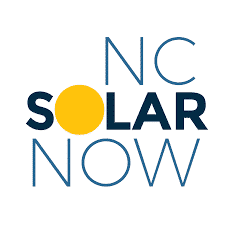
Local Service
Average cost
Pros
- Locally owned and operated
- Competitive pricing
- NABCEP-certified technicians
Cons
- Less customization than competitors offer
- Slightly limited service area
NC Solar Now has over a decade of localized experience working specifically in North Carolina, and its representatives have more specialized and professional experience than most other local providers.
The company doesn’t accept leases or PPAs, and we do wish the workmanship warranty was longer.
Why We Chose NC Solar Now as the Best for Local Experience
NC Solar Now has, by its own calculations, installed more solar arrays in North Carolina than any other company. Just looking at the company’s awards and accolades, this makes sense. NC Solar Now has affiliations with the NC Sustainable Energy Association, NC Clean Energy, NC Green Power and a handful of other local energy efficiency organizations. Few other companies in the state have achieved such distinctions.
This doesn’t prove that the company is reputable, but it does suggest that it knows what it’s doing and has the experience and know-how to install a system that suits your needs exactly. These distinctions help the provider stand apart from the nearly 100 installers in the area.
NC Solar Now also employs NABCEP-certified technicians that also hold state general contracting and electrician’s licenses. This helps ensure that your system is installed properly and safely, which provides peace of mind that it will persist through the frequent severe weather in the area.
What We Don’t Like
NC Solar Now doesn’t accept leases or PPAs, so although the cost of going solar with the company is below average for the area, its services are still not going to be as readily available to homeowners who can’t make a cash purchase or loan work.
Additionally, NC Solar Now also has a 12-year workmanship warranty. Although this is a little longer than average, we like to see labor warranties even longer in North Carolina and other areas where extreme weather and above-average rainfall are common.
Solar Products
Unlike most companies, NC Solar Now is willing to work with most monocrystalline panel brands to help you find the option that’s best for your budget and your specific home. As a small, local installer, this company is able to customize your system fully to match your energy needs and pricing expectations. You’ll get one-on-one service from a rep that will help you choose the brands that are ideal for your solar project.
Below is a breakdown of some additional products and services you can request from NC Solar Now:
- Solar batteries, including a variety of brands
- EV chargers, including options from Tesla, BMW, Nissan, Bosch, Schneider Electric, GE and more
- Ground-mounted solar panels
- Solar attic fans
- Insulation, including Thermal Shield
The availability of multiple battery brands is outstanding, and the choice will be even more valuable as NEM 3.0 kicks in and makes batteries more valuable overall.
Financing Options
As mentioned above, NC Solar Now only accepts cash and loans, so the payment options are somewhat limited. We recommend a cash purchase if you can make it work, as this will save you the most money — an average of $24,794 in North Carolina — over time. By comparison, a loan from NC Solar Now will average around $30,800, which includes interest payments. However, loans do come with a lower upfront cost, often totaling nothing at all.
Warranty Information
NC Solar Now includes a 25-year warranty for the equipment it installs, as well as the panel efficiency. The efficiency warranty is a little longer than most companies offer.
The company also provides a 12-year labor warranty, which is two years longer than the industry average. While it’s great to see an above-average workmanship warranty, we would ideally like this to be even longer, especially given the frequency of extreme weather in North Carolina.
Facts and Figures: NC Solar Now
| EcoWatch Rating |
|---|
| Better Business Bureau (BBB) Rating |
| Average Cost ($-$$$$$) |
| Solar Services |
| 4.5 |
| A+ |
| $$ |
| Solar Panels, Solar Batteries, EV Chargers |
Watch Below: Learn Why North Carolina Is the Perfect State To Go Solar
How To Save Money When Hiring A Solar Company In North Carolina
At about $3.21 per watt, the average price for a North Carolina solar system is between $17,976 to $31,458 after the federal investment tax credit. This price may be lower than the average solar system price, but many homeowners still look for ways to save as much money as possible.
Luckily, the state of North Carolina and local utility companies offer several different incentive programs to help you save money and there are other money-saving tricks to employ.
North Carolina Incentives and Rebates
Your solar panels will save you money on your monthly energy bill, but one of the best ways to save money on your new solar system is to cash in on incentive programs and rebates. Every North Carolina resident can benefit from the 30% back from the federal solar tax credit, but there is even more money to be saved.
We’ve included a brief list of incentives below that you may be eligible for, but also have an entire page dedicated to how North Carolina’s solar incentives can help to reduce the cost of going solar.
| North Carolina Solar Incentive | Description |
| North Carolina Property Tax Abatement | Even though solar panels will increase your property’s value, you will not be taxed on this increase. |
| North Carolina Net Metering Policy | Overproduction from your solar panels may be credited toward future energy bills. |
| Duke Energy Solar Rebate | Duke Energy customers can get monetary incentives by installing solar panels. |
| Financing Program for Renewable Energy and Energy Efficiency | North Carolina law states that solar loan programs cannot go above 8% interest rate and must have a maximum term of 20 years. |
| Local North Carolina Incentives | More local incentives may be available in your area. Ask your solar contractor for more information. |
System Size
To save the most money on your solar system, don’t buy a system that is too large. North Carolina does have good net energy metering policies that will credit extra energy production towards your next energy bill, but you still don’t need to invest in a large system that consistently produces more energy than you can use. This will be even more valuable as the new net metering 3.0 policy falls into place.
Instead, evaluate your monthly energy usage and determine the right-sized system for your home. You can easily do this by reviewing your monthly energy statements, but you should also ask local solar installers for their opinions because they know the area best.
Community Solar in North Carolina
If you want to benefit from solar energy but do not want to pay the high upfront costs for solar electricity, you should consider community solar. It may still be a work in progress, but some North Carolina communities have community solar gardens that will save you money on your energy bills.1 If you are a renter or have another constraint that limits your solar-building capabilities, all you need to do is pay for the monthly subscription.
Currently, this perk is available in cities such as Fayetteville, Greensboro and Durham. So if you reside in other areas, such as Raleigh and Asheville, you may need to install your own solar panels.
Read Also: Calculate How Much You Can Save By Going Solar
Will Solar Increase Your Home Value In North Carolina?
Yes, solar panels do increase your home’s value. Monthly energy savings are likely the driving force behind your desire for solar panels, but it’s important to keep the other benefits you can reap from your solar panel system in mind. When you install solar panels on your home, you will see an increase in your home’s value. The best part? You don’t have to pay taxes on that increase.
According to data gathered from Zillow, the average North Carolina home is valued at $320,324, and at the average 4.1% property value increase2, homeowners will see $13,123 added to the value of their home. This makes solar panels an excellent investment in North Carolina, and one you will see should you sell your home.
Should North Carolina Residents Hire a Professional Solar Installer Or DIY?
Solar panel installation is expensive, so you — like many other North Carolina residents – may have considered a DIY solar installation. If you install your own PV panels you may save money now, but if you aren’t careful as you undergo the installation process, you could cost yourself thousands of dollars in damage to your home.
Save Your Home From Roof Damage
Even if you have extensive DIY home improvement experience, there is always the chance that you could damage your home when you install solar panels. When you hire professional solar installers, your solar panels will be installed correctly and without damage to your roof and home.
Install Solar Panels to Building Codes and Pass Building Inspections
To install solar panels, you have to get certain permits and pass inspections before you can receive permission to operate. If you do not install your panels correctly, you could potentially be fined or have to remove your panels altogether.
By hiring professionals, you are guaranteed to pass all your inspections and are much less likely to run into any problems with building permits.
Benefit from Workmanship Warranties
Most professional solar installers have workmanship warranties that will cover the cost to fix your solar panels or shingles if any were damaged during installation. If you install your panels yourself, you’ll miss out on this protection.
Even if you have product or performance warranties from your manufacturer, you may not be able to benefit from these. Your solar panels’ manufacturer could come back and claim that the problem is poor installation and not the product, which means you’d have to pay to fix your panels by yourself.
What Should North Carolina Residents Look For in a Solar Installer?
As you look for the right solar installer for your home, it’s important to find a company that checks all your boxes. Quality solar panels and expert installation should be your top priority, but you should also consider:
- Warranty coverage
- Years in business
- Services offered
- Service area and headquarters
- Industry affiliations
- Customer experience
- Solar pricing and financing
Warranty Coverage
A reputable solar energy system is backed by a strong warranty, and every single company on our list of best solar panels in North Carolina comes with an industry-excellent 25-year warranty. Not all warranties are equal, but any company that offers a separate workmanship warranty alongside product or performance warranties should be at the top of your list.
Solar panels often come with these two types of warranties:
- A performance warranty on solar panels often guarantees 90% production for up to 10 years, then 80% until 25 years.
- An equipment warranty on solar panels usually guarantees 10 to 12 years of working without failing.
Keep in mind that solar panel warranties don’t cover severe weather damage or accidents that occurred on your property. However, photovoltaic installations are considered home improvement projects, and insurance companies often extend coverage to such incidents.
Years in Business
A company’s age is not always the best indicator of its services, but many solar veterans have ten or more years in business to their names. We advise homeowners to look for companies that have more experience because these companies have likely installed more solar panels in North Carolina, and thus, have the expertise needed to advise you on your home solar project.
The most experienced solar provider on our list is SunPower, but that doesn’t mean you should count out newer companies such as ADT because this company alone has installed more than 55,000 solar panels.
Services Offered
Many solar companies primarily install solar panels, but additional services — such as electrical contracting, roofing and energy efficiency audits and upgrades — show how much industry knowledge and experience a provider brings to the table.
Local companies, such as NC Solar Now and 8M Solar, offer more services than just solar panel installation. North Carolina residents can trust these providers to do more than just install solar panels and move on. Instead, these companies want to do more for your home and will quickly come to your aid should your panels need repairs.
Service Area and Headquarters
Take note of both the solar provider’s service areas and headquarters. A company based out of state may have issues with communication if it relies on third-party subcontractors. If you have a backup battery or inverter failure, will the company respond efficiently and investigate thoroughly?
Local companies – such as NC Solar Now, 8M Solar and Covenant Solar – are located in North Carolina. Not only do local installers know the area best, but it means that you won’t have to scramble to find an electrician to do maintenance on your panels should your system break down.
Industry Affiliations
A solar provider’s industry affiliations reflect its service scope, ethics and qualifications. You should look for these certifications because it indicates a company upholds industry standards and follows solar installation best practices.
- Solar Energy Industries Association (SEIA)
- North American Board of Certified Energy Practitioners (NABCEP)
- Certified B Corps
We also advise our readers to check IREC’s National Solar Licensing Database, as well as your state government’s licensing requirements. Your solar provider should operate with the proper business and contracting licenses.
Customer Experience
One of the best ways to research a company is to read its reviews. You can look at the Better Business Bureau (BBB), Google Reviews or Yelp because you will find honest reviews from real North Carolina customers. If you look for ADT, for example, you might find that customers rave about how smooth the solar installation process was, but others complain about pushy sales pitches and poor communication after installation.
Solar Pricing and Financing
Cost is one of the biggest concerns that solar shoppers have as they research solar panel options. Solar panel systems are expensive, and not every homeowner wants to pay top dollar for a high-efficiency panel from SunPower. Instead, some homeowners may want more affordable options, such as the panels and financing packages offered from Blue Raven.
You can get a good sense of financing options if you gather quotes from reputable solar companies. As you get quotes and talk to solar representatives, you should look for:
- Companies that focus on education on solar incentives, such as rebates, renewable energy credits, the federal tax credit and application assistance, such as 8M Solar
- Flexibility with down payments, payment plans, interest rates and loan partners, such as SunPower
- No obligation, free quotes and no upselling, like with NC Solar Now
Methodology: How We Reviewed the Best Solar Companies in North Carolina
Since there’s so much competition within the solar industry in the area — with around 100 installers servicing the state — our process for finding the best solar companies in North Carolina was a long and involved one. We assessed dozens of companies based on six primary criteria, which we then weighted to bring you the best of the best.
We’ll explain the criteria we used below, as well as why we feel each was an important factor in our decision.
- Local reputation and reviews (20%): With so many solar installers in the area and so much demand — the state is the fourth most popular place to go solar — it’s natural that some companies enter the solar space to capitalize. Unfortunately, some of these companies are less interested in quality installations than they are in profit. We assess each company’s local reputation and read through dozens of reviews to see where the company excels and where it tends to fall short of customer expectations.
- Pricing and financing (20%): The all-in cost of going solar in North Carolina is between $4,000 and $6,000 higher than the national average, with the typical system totaling $33,705 before incentives. To help direct homeowners toward affordable solar solutions, we look for installers that maintain average or below-average pricing. We also prioritize installers that accept a multitude of financing options, as more options mean more availability for more homeowners.
- Warranty coverage (20%): North Carolina sees a lot of extreme weather every year, including severe winds, hurricanes, tropical storms and above-average annual rainfall. For this reason, we feel that the workmanship warranty should be above-average, so we prefer companies that have labor warranties longer than ten years. Equipment and efficiency warranties are always helpful, too, and can help provide peace of mind that your above-average energy consumption will continue to be offset.
- Services offered (20%): We look for companies that offer a wealth of services both in and outside of the solar industry. Although solar batteries aren’t terribly popular in the Old North State because of the excellent net metering policy, EV chargers and energy efficiency home improvements are popular. We rank companies higher that offer a wider range of services that will appeal to more residents. We’re putting added emphasis on companies that install batteries, as well, as the new net metering policy in California, which will soon be adopted in North Carolina as well, will make batteries far more valuable for residents, especially given that the average monthly electricity consumption in NC is 160 kWh higher — around 18% higher — than the national average.
- Company experience (10%): With such a high demand for solar equipment in NC, lots of companies have cropped up in the past few years to take advantage. We try our best to recommend companies with a minimum of ten years of experience. This not only helps ensure that your system will be installed properly and stand up to the severe weather conditions in the area, but it also reduces the risk of your installer going out of business and voiding your precious warranty coverages.
- Brand quality (10%): Finally, we look at the solar equipment brands offered by each installer. Specifically, we look for companies that include budget options to help keep the above-average installation costs down, as well as high-efficiency options that are more likely to offset and even eliminate the above-average electric bills in North Carolina.
FAQ: Best Solar Companies in North Carolina
Understandably, several unanswered questions come to mind as you shop for home solar. Here are a few of the most common questions we get from our North Carolina readers about the best local solar installers. If you have specific questions that aren’t answered here, reach out to our team of solar experts at solar@ecowatch.com.
North Carolina has a lot of reputable solar companies, so it’s hard to narrow down the list. 8M Solar is our best overall for North Carolina because this company knows the state well, but SunPower is a stellar national provider that has expansive solar knowledge. The best home solar installation company in North Carolina will depend more on your specific energy needs and location.
Yes, it certainly does. Photovoltaic panels can look similar aesthetically, but they vary in efficiency, durability, and affordability. Solar energy system customization by select solar installers can help you decide what is best for your home based on energy audits. Different solar brands may be best suited for your home.
North Carolina is based in a subtropical climate, so you may want solar panels that are more efficient. Monocrystalline panels possess black cells made of single crystals and provide higher efficiency, though at a higher price.
You may use our criteria, as described above, to help formulate your own assessment strategy. We recommend that homeowners gather quotes from several solar installation companies in North Carolina. What recommendations are they generally aligned on making for your solar system? Are any solar rebate programs or net metering available? For example, Duke Energy offers net metering.
Pay attention to the energy audit and energy savings recommendations made by the solar installer. Are they asking relevant questions about your interests and needs when it comes to solar solutions and savings? Or, are they trying to upsell you?
Related articles
Top Solar Installers In North Carolina Cities
Comparing authorized solar partners
-
- Most efficient panels on the market
- National coverage
- Cradle to Cradle sustainability certification
- Great warranty coverage
- Expensive
- Customer service varies by local dealer
A+Best National Provider1985SunPower Panels
Having trouble deciding? Click below and use our process to receive multiple quotes instead:

 233k
233k  41k
41k  Subscribe
Subscribe 


